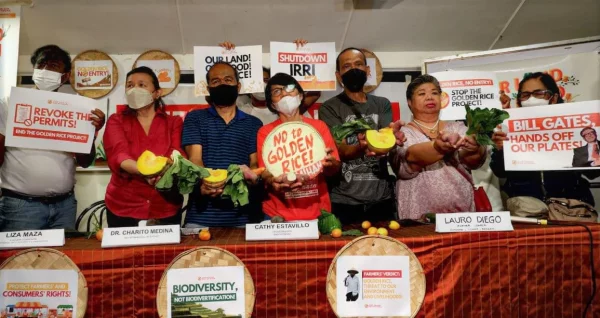Golden Rice, Bt Eggplant, Bt Corn, Golden Kuhol, Masagana 99: The Common Denominator
By: C-Help Team
When we hear about genetically modified organisms (GMOs) in agriculture such as Golden Rice, Bt Eggplant and Bt Corn, we can’t help but liken its promises of health and economic benefits to that of Golden Kuhol’s and Masagana 99’s, some decades ago.
Between 1982 and 1984, the golden apple snail (kuhol) was introduced in the Philippines to help low-income Filipino farmers supplement their sources of food protein. However, in 1986, the golden kuhol started causing significant damage to rice farms in northwestern Luzon. Its rapid multiplication and wide distribution threatened the rice production and food security in the country.
Masagana 99 was implemented about ten years earlier.
According to National Scientist Emil Javier, 36% of 1.13 million small rice farmers availed of loans under the Masagana 99 program in May 1974. At that time, farmer payback of the loans was 90% collected. But by 1980, repayment for loans shrunk to 35% or lower, and only 3.7% of small rice farmers were taking out loans. Because farmers couldn’t pay up, 800 rural banks went bankrupt while small rice farmers were buried in debt. Dependence on the Masagana 99 pesticides and herbicides damaged the environment. The program was scrapped in 1984.
On the other hand, in December 2002, the Philippine Department of Agriculture (DA) approved the planting and sale of YieldGard, Monsanto’s Bt corn, amidst protests and hunger strikes. Although numerous studies production and farmers’ harvests and income, there was parallel increase in their cost of production, and decline in the quality of the environment that eventually defeated the promise of profit and benefits of Bt Corn.
Twenty years later, the DA is singing the same tune.
It approved the commercial propagation of Golden Rice and for Direct Use As Food And Feed, Or For Processing and commercial propagation of BT Eggplant. Golden Rice and Bt Eggplant are GMOs like Bt Corn, and their introduction to agriculture promises health and economic benefits like the promises of Golden Kuhol and Masagana 99.
Golden Rice is a rice that “has been modified by inserting a gene from maize and a gene from bacteria found in soil which allows the plant to biosynthesize beta-carotene in the edible parts of rice.”
It is intended to address vitamin A deficiency of Filipinos. The Bt Eggplant is an eggplant into which a gene from the soil bacterium Bacillus thuringiensis has been inserted. It is supposed to improve the harvest and income of eggplant growers.
However, there is a global debate on the safety and efficacy of these GMOs. Some concerns about Golden Rice and Bt Eggplant include contamination of non-GMO seeds, development of pest resistance, “superweeds,” and secondary pests, etc.
In the Philippines, the concerns about GMOs were raised through administrative opposition, court cases, policy reform calls, and campaigns. Several provinces and cities decreed the inability of the co-existence of organic agriculture with genetically-modified crops, and chemical intensive farming. Some of these local governments even have GMO Ban Ordinances. Thousands of Filipinos signed up a petition in 2014 and submitted opposition letters to the DA in the following years against Golden Rice and Bt Eggplant.
The common denominator of the Golden Kuhol, Masagana 99, Bt Corn, Golden Rice and Bt Eggplant is that they are technology fixes to problems that are not purely technological in nature. Protein and vitamin A deficiencies, and poor yield and meager farmers’ income, have social, economic, and cultural contexts, plus environmental considerations; thus, the solutions to these problems cannot succeed out-of-contexts.
To know more about the rising concerns with GMOs, please refer on the links below:
https://www.facebook.com/MASIPAGFarmers/
https://twitter.com/masipagfarmers?lang=en
https://mb.com.ph/2021/08/29/ph-govt-urged-to-review-biosafety-permits-granted-to-golden-rice/
https://business.inquirer.net/202683/greenpeace-ngos-urge-halt-to-gmo-cultivation
https://www.reuters.com/article/us-philippines-gmo-idUSKCN0VP0TE
At Community Legal Help and Public Interest Centre (C-Help), we assist those who are demanding for independent risks and impacts assessment, sufficient public participation opportunities, and precautionary measures before allowing the commercial propagation of GMOs.
JOIN US—as volunteer, supporter or donor—in the legal and policy advocacies against Golden Rice, Bt Eggplant and GM Corn.

